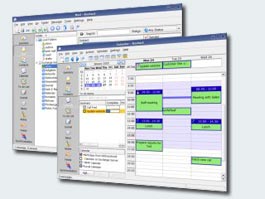Kontact/da: Difference between revisions
Created page with '* Kontact vejledninger :: * Hvordan du sender SMS'er i Kontact' |
Created page with '==Hvor får du hjælp==' |
||
| Line 31: | Line 31: | ||
:: * Hvordan du sender SMS'er i Kontact | :: * Hvordan du sender SMS'er i Kontact | ||
== | ==Hvor får du hjælp== | ||
There is a mailing list at | There is a mailing list at | ||
Revision as of 14:37, 10 June 2010
Template:I18n/Language Navigation Bar
 |
Kontact er KDE's personlige informationsmanager (PIM). |
Kontact pakken forener KDE's veludviklede og testede PIM-applikationer under en hat. Ved hjælp af den kraftfulde KParts teknologi kan eksisterende applikationer problemfrit integreres i en applikation.
Kontact's komponenter er skræddersyet til arbejde godt sammen. Der resulterer i funktioner som træk-og-slip mellem aftalehåndteringen, gøremålslister og adressebogen. Kontact understøtter flere groupware-servere. Når du bruger sådan en server har din arbejdsgruppe adgang til delte email-mapper, gruppe-gøremålslister, kalenderdeling, central adressebog, planlægning af møder og lignende.
Kort sagt: Kontact's nyskabelser hjælper dig til at håndtere din kommunikation lettere, organisere dit arbejde hurtigere og samarbejde tættere og gør dig mere produktiv og effektiv.
Komponenter
Disse programmer kan integreres i Kontact:
- Akregator - Læs dine yndlings-nyhedskanaler
- KAddressBook - Hold styr på dine kontakter
- KJots - Dine ideer organiseret i en notesbog
- KMail - Mailklient
- KNode - Din usenet nyhedsgruppe-læser
- KNotes - Notater, du kan sætte på skrivebordet
- KOrganizer - Kalender og planlægning, dagbog
- KTimeTracker - Hold styr på den tid, du bruger på forskellige opgaver
- Summary - Kontact's opsummeringsskærm
Se også
- * Hvordan du sender SMS'er i Kontact
Hvor får du hjælp
There is a mailing list at
- kdepim-users - for users of the KDE PIM applications (Kontact, KAddressBook, KMail, KOrganizer, KNode, ...) [subscribe to kdepim-users] [archive of kdepim-users]. A team of developers and users aim to give answers as quickly as possible
and for urgent help, an IRC channel on Freenode
- for users and developers of Kontact - #kontact
FAQ, Hints and Tips
Migrating your setup to a new distro
In KMail, right click on your Inbox and choose Properties. Go the Maintenance Tab. Have a look at the Location. It has either .kde4 or .kde in the path.
Substitute the appropriate path below.
You need the following config files:
- .kde4/share/config/emaildefaults
- .kde4/share/config/emailidentities
- .kde4/share/config/kmail.eventsrc
- .kde4/share/config/kmailrc
- .kde4/share/config/kaddressbookrc
- .kde4/share/config/kresources/contact
- .kde4/share/config/korgacrc
- .kde4/share/config/korganizerrc
- .kde4/share/config/knotesrc
- .kde4/share/config/mailtransports
and the following directories:
- .kde4/share/apps/kmail
- .kde4/share/apps/kabc
- .kde4/share/apps/korganizer
- .kde4/share/apps/knotes
If you use Akregator within Kontact, you will also need:
- .kde4/share/config/akregator.eventsrc
- .kde4/share/config/akregatorrc
and the whole .kde4/share/apps/akregator directory.
Of course the simplest way is just to keep your whole home directory. :-)
Just a word of warning. If the directory naming is different between Desktops or between the two versions of your distro, this will not work as there are references to the directories within the config files. This means that if the files were in a .kde directory, you cannot just put them in a .kde4 directory without editing the references within the config files.
Hiding the Kontact Sidebar
On small screens, you may wish to reclaim the space used by the Kontact sidebar. You can replace it with an (editable) toolbar:
- Settings->Toolbars->Navigator [x]
- Drag the left panel closed using the splitter between it and the main panel, job done.
Enabling SOCKS support in KMail and KNode
Unlike KDE 3, KDE 4 does not have built-in SOCKS support yet. However, it is still possible and relatively simple to make KMail and KNode use a SOCKS proxy, by using proxychains or other similar tools like tsocks or socksify. Assuming that proxychains is correctly installed and configured, all you need to do is to open a terminal (e.g. Konsole) and type:
proxychains kdeinit4
You don't even need to restart KMail/KNode! (You need to type the above command every time you start a new KDE session though).
